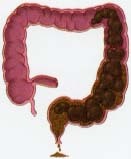Soiling (Encopresis)
Soiling, also called encopresis (en-ko-PREE-sis), is having uncontrolled bowel movements in one's underwear.
KEYWORDS
for searching the Internet and other reference sources
Encopresis
Enuresis
Young children routinely have bowel movements in their diapers or underwear, but by about age 3 most children are able to maintain good bowel control and can be toilet-trained. When people who have established bowel control begin to have a bowel movement in their pants, the condition is called soiling, or encopresis. This soiling is often a leaking and not a full bowel movement. Most people who have a problem with soiling do not even realize that it is happening, because they do not feel as if they are having a bowel movement. In the majority of cases, encopresis is a medical problem. This medical problem can have serious psychological effects, ranging from embarrassment to family stress to teasing.
Why Does Soiling Happen?
Soiling is related to constipation (kon-sti-PAY-shun). Constipation is infrequent, hard, and painful bowel movements. When food goes through the digestive system, it is broken down into a thick, sludgelike liquid. The nutrients that the body needs, such as sugars, are absorbed from this liquid in the small intestine. The rest of the material passes into the large intestine, where water is reabsorbed. The remaining solids, called feces (FEE-seez), are then passed out of the body as a bowel movement.

When the bowels move infrequently, the large intestine reabsorbs so much water that the feces become hard and compacted. As a result, bowel movements are painful, causing many people to try to avoid having them. This only makes the problem worse. Eventually, the mass of hard solids in the large intestine causes it to stretch out of shape. As it stretches, small amounts of liquid sludge from the small intestine seep around the hard mass of feces in the large intestine and then leak out of the body. This is the material that causes soiling.
Some adults think that children soil on purpose or that soiling is evidence of a psychological problem. In reality, soiling accidents are not intentional. In fact, people often do not know that soiling is happening until feces are noticed or others smell it. At times the person with encopresis may not even smell the accident. Sometimes children who are teased or embarrassed about soiling can have emotional or behavior problems. Generally, once the soiling is treated and stops, these problems will disappear.
How Is Soiling Treated?
There are three steps to treating soiling:
- Empty the large intestine
- Establish regular bowel movements
- Maintain regular bowel movements.
An enema or a laxative medication often is used to empty the large intestine. With an enema, liquid is pushed into the large intestine to soften the hard mass of feces and create the urge to expel it. Sometimes strong laxatives are used instead, to encourage the intestine to contract and push out the feces.
Once the large intestine is unblocked, it is important to establish regular bowel movements to keep it clear. A doctor may recommend laxatives taken by mouth, such as milk of magnesia, products that contain senna, or mineral oil. These laxatives keep waste material moving quickly through the large intestine so that it remains soft. Setting aside time each day to try to have a bowel movement (usually after breakfast or dinner) also helps establish a regular schedule.
Once a person is having regular bowel movements daily, laxatives are reduced and then gradually eliminated so that a regular schedule can be maintained without artificial assistance. Eating a high-fiber diet and drinking plenty of liquids also help maintain bowel regularity. Once feces move through the large intestine in a regular, painless way, the problem of soiling disappears. Unfortunately, it often takes time for soiling to be diagnosed correctly and properly treated. Sometimes consultation with a mental health professional, who works with a person's doctor, helps in developing a good behavioral treatment program that also minimizes emotional difficulties.
See also
Bedwetting (Enuresis)
regards
Mina